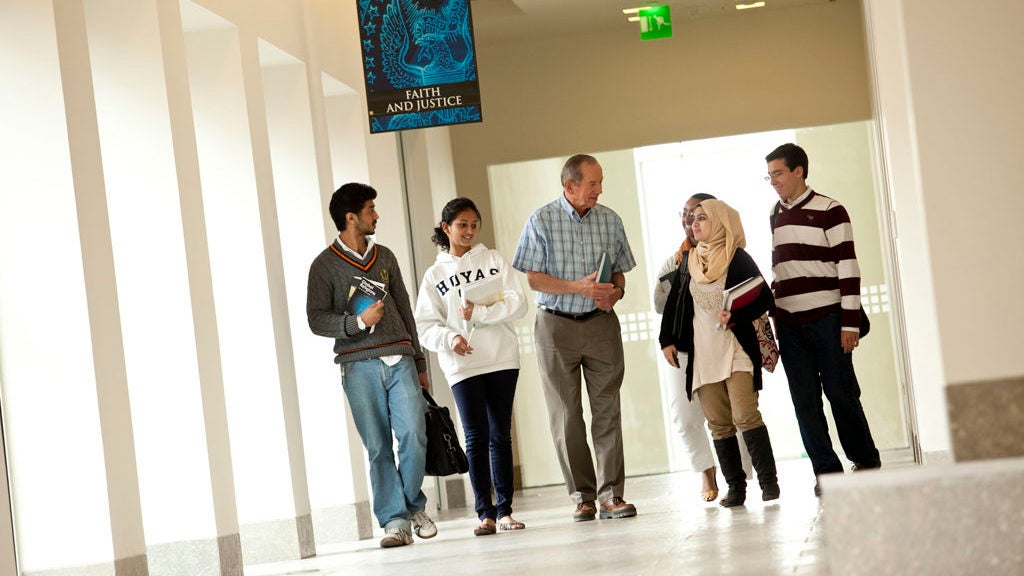Georgetown University Masters Program Ranked #1 in International Relations Bachelor of Science in Foreign Service Ranked in Top 5

President William Clinton studied there. Former Secretary of State, Madeleine Albright and former Deputy Assistant Secretary for Defense for the Middle East, Colin Kahl, are professors at its School of Foreign Service (SFS). And now the Edmund A. Walsh School of Foreign Service has been ranked number one by Foreign Policy Magazine for its Master’s program and fifth overall for its undergraduate programs in international relations (IR), respectively.
The school earned the accolades based on the Teaching, Research, and International Policy (TRIP) project at the College of William and Mary, involving feedback from 1,582 IR scholars who rated Georgetown University as offering the best master’s program worldwide for students who want to pursue careers in international relations. Georgetown University’s School of Foreign Service, whose branch in Qatar’s Education City, known as SFS-Q, also ranked among the top five, among Harvard, Princeton, Stanford and Columbia, for the best universities for an undergraduate international relations education. This is the same Bachelor of Science in Foreign Service (BSFS) degree offered at SFS-Q in Doha.
“Georgetown SFS-Qatar is not only equipping a new generation of students in the Middle East to effectively confront this rapidly changing world, but also contributing to the evolving needs of teaching and research in the international arena that the current historic changes have necessitated. We are proud of the work of our students, faculty and administration and honored that our colleagues hold us in such high esteem,” commented SFS-Q Dean Gerd Nonneman.
“We are really very pleased that once again that we have been ranked number one as a place get a Master’s degree in International Relations and as number five as a place to get an undergraduate degree in International Relations; we think this is an affirmation of all the hard work we have done both here in Qatar and also in Washington DC. We are going to go forward and take Georgetown to an even higher level and look forward to continuing to be at the top of the field,” noted SFS Dean Carol Lancaster on her brief visit to Qatar for a Joint Advisory Board meeting.
Founded in 1789, Georgetown University is the oldest Catholic and Jesuit University in the United States. Today, it is a major student-centered, international, research university offering respected undergraduate, graduate and professional programs in Washington D.C., Doha and at partner educational institutes around the world. The establishment of the Qatar campus in 2005 continues a long tradition of engagement in the Middle East, begun over thirty years ago with the most comprehensive Arab-focused academic center in the United States, the Center for Contemporary Arab Studies (CCAS).
Meanwhile, since 1919, the School of Foreign Service at Georgetown University has devoted itself to educating the next generation of diplomats, global leaders and scholars. At the Doha campus, students have the opportunity to major in International Economics (IECO), International Politics (IPOL) or Culture and Politics (CULP), as well as certificates in Arab & Regional Studies, and in American Studies.
“There is a significant emphasis on making a positive impact in the real world at Georgetown. It is important to augment classroom theory with practical experience. Students at SFSQatar obtain a broad range of knowledge in international affairs based on our renowned curriculum and also through active participation in crisis simulation exercises, service learning trips to areas of conflict and via participation in the Model United Nation,” said Moamer Qazafi, director of Communications.
The fourth wave of the TRIP survey builds on previous faculty surveys conducted in 2004, 2006 and 2008, with the latest featuring many new questions on disciplinary practices and current foreign policy debates and including, for the first time, 20 countries.
The results summarize the responses of 1,582 faculty members, representing more than 40 percent of all IR scholars in the US, collected between August and November of 2011. A parallel survey of practitioners surveyed 244 current and former policymakers who served from 1989 to 2008 in national security decision-making roles at the level of assistant secretary, director and designated policymaking groups within several US government agencies.